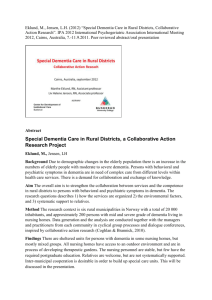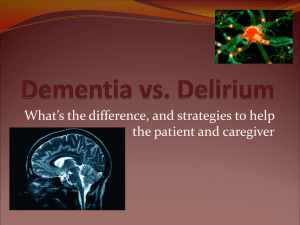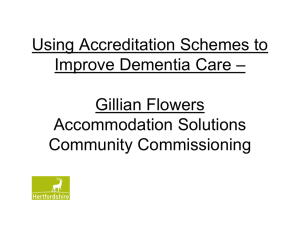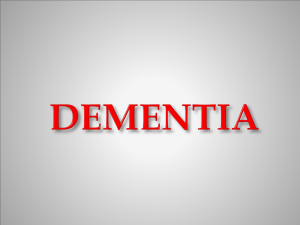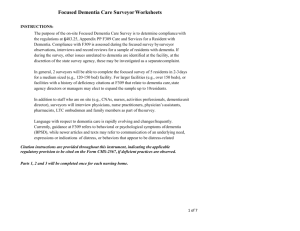Common Mistaked in Geriatrics
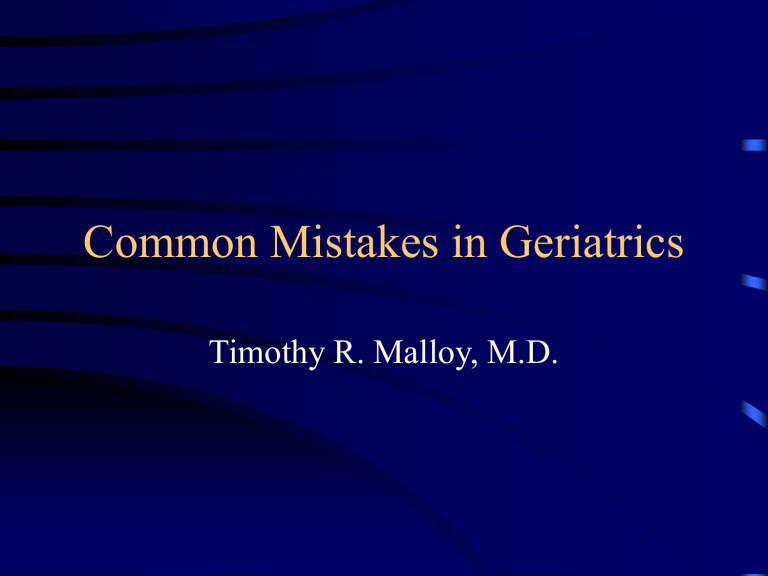
Common Mistakes in Geriatrics
Timothy R. Malloy, M.D.
Overview
• Ample personal experience with making geriatric mistakes
• polled 10 geriatricians/geriatric psychiatrists
• “Top 20” mistakes but not in order of importance or frequency
• alternative approach offered
#1. “My doctor told me it was because I was old”
#1. “My doctor told me it was because I was old”
• Not true for most conditions
• Conveys message that patient is no longer important enough to bother with
• Is not therapeutic in any way
• Viable therapeutic options go overlooked
#2. Talking to the daughter
(ignoring the patient)
#2. Talking to the daughter
(ignoring the patient)
• Insensitive, degrading
• Very commonly done in patients with hearing impairment, visual impairment, and especially cognitive impairment
• Sometimes difficult to avoid
• Be “on guard” and situate family and patient directly across from yourself so that both can see and hear you at the same time
#3. Seeing Nursing Home
Patients in the Office
#3. Seeing nursing home patients in the office
• Artificial environment of office
• No collateral sources of information available (see #5)
• Better seeing patients in their own environment
• More efficient in nursing home
• More cost-effective in nursing home (zero overhead)
#4. Seeing Nursing Home
Patients Without a Nurse
#4. Seeing nursing home patients without a nurse
• Nursing input is critically important
(especially in this population)
• 10 lb. charts - very difficult to discover information
• Direct communication with nursing staff:
– cuts down phone calls
– improves coordination of care plan
– allows opportunity for teaching (both ways)
#5. Making Nursing Home
Rounds on Your “Day Off”
#5. Making Nursing Home
Rounds on Your “Day Off”
• Makes NH rounds into chore that interferes with personal time
• Rounds should be scheduled during routine
M-F work hours
• Weekly for 1 hour is better than monthly for
4 hours
#6. Delayed Diagnosis of
Dementia
#6. Delayed diagnosis of dementia
• Dementia symptoms are usually present for
3 years before diagnosis
• Over 50% of the 5 million people with dementia are undiagnosed
• Always better to have the problem identified
#6. Delayed diagnosis of dementia
• Compliance with medications and appointments
• Unreliable symptom reporting (undetected, treatable medical conditions)
• Safety issues, auto accidents, environmental exposure
• Financial victimization
• Social isolation and neglect (until crisis situation)
• Missed opportunity to begin treatment at early stage
#7. Failure to Treat Dementia
#7. Failure to treat dementia
• Cholinesterase inhibitors help
• Cholinesterase inhibitors help cognition, preserve function, delay institutionalization, and lessen behavioral complications
• Not using MMSE to help decide efficacy
#8. First Line Treatment of Agitation with Benzodiazepines in Patients with
Dementia Related Behavioral
Disturbances
#8. First line treatment of agitation with benzodiazepines in patients with dementia related behavioral disturbance
• Seldom the most appropriate treatment
• Unfavorable risk : benefit ratio
• Need to determine the specific target symptom and tailor treatment to that symptom
– examples: psychosis - antipsychotic, e.g. Zyprexa mood lability - mood stabilizer, e.g. Depakote depression - antidepressant, e.g. Zoloft
#9. PRN Analgesics for
Dementia Patients
#9. PRN analgesics for dementia patients
• Memory problems usually result in underdosing
• Frequently have to “play catch-up”
• Routinely schedule analgesics more effective
#10. Sensory Deprivation
Masquerading as Dementia
#10. Sensory Deprivation
Masquerading as Dementia
• Severe hearing impairment - “irrelevant” responses to questions
• Visual impairment - failed MMSE, visual hallucinations (Charles Bonet syndrome)
#11. Failure to Rule Out Organic
Causes Masquerading as
Depression
#11. Failure to rule out organic causes masquerading as depression
• Should check TSH before treating depression
• Remember medication side effects (Beta blockers, Digoxin, benzodiazepines….)
• Inadequate pain management
• Parkinson’s Disease, Thyroid Disease,
Cognitive failure
#12. Polypharmacy
#12. Polypharmacy
• Elderly receive 3Xs as many meds as young people
• Elderly are less capable of “handling” medications as younger people
• “Art” of recognizing medication side effects
• Many examples such as cognitive SEs,
EPSEs, Appetite SEs….
#13. Continuing Elavil When
Neurologists and Rheumatologists
Place Your Patients on it
#13. Continuing Elavil when neurologists and rheumatologists place you patients on it
• Still commonly prescribed
• Almost never appropriate (2nd generation
TCAs better tolerated)
• Highly anticholinergic
• The older the patient, the more likely to be a problem
• “dead give away” that you’ve never taken a course in geriatrics in the last 20 years
#14. Demerol as Acute
Analgesic
#14. Demerol as Acute
Analgesic
• Usually causes confusion (delirium)
• Several safer alternatives
#15. Benadryl for Insomnia
#15. Benadryl for Insomnia
• Impairs cognition (even in younger adults)
• Beware of many OTC medications such as
Tylenol PM
• Better alternatives available
#16. No Osteoporosis Treatment with Obvious Disease
#16. No osteoporosis treatment with obvious disease
• Never too old to benefit from osteoporosis treatment
• Approximately half of all hip fracture patients are on no treatment
• Calcium, Vitamin D, antiresorptive agent?
#17. NSAIDs/COX-II Inhibitors as First and Only Treatment of
Osteoarthritis
#17. NSAIDs/COX-II inhibitors as first and only treatment of osteoarthritis
• Expensive
• Numerous side effects
• Patients often remain on NSAIDs for years
• Many potentially better alternatives such as
Acetaminophen, physical therapy, corticosteroid injections, opioids
#18. Mistaking Delirium for a
Primary Psychiatric Diagnosis
#18. Mistaking delirium for a primary psychiatric diagnosis
• UTIs as frequent cause of admission to geripsych. Hospital
• Cause of delirium almost always “lies outside the brain”
• Most common presenting symptom is fluctuating levels of alertness and confusion
#19. Delaying Hospice and
Palliative Care
#19. Delaying Hospice and
Palliative Care
• Avoiding serious end-of-life discussion in patients with advanced irreversible conditions (AD, COPD, CHF)
• Early discussion is often welcome
• Prevents unnecessary procedures, hospitalizations, suffering, and expenditures
#20. Failure to Factor Life
Expectancy into Medical
Decision Making
#20. Failure to Factor Life
Expectancy into Medical
Decision Making
• HCM (paps, mammography, PSA, colonoscopy)
• Hyperlipidemia management
• Anticoagulation for atrial fibrillation




